Crellin Surname Ancestry ResultsOur indexes 1000-1999 include entries for the spelling 'crellin'. In the period you have requested, we have the following 83 records (displaying 61 to 70): Single Surname Subscription | | | Buying all 83 results of this search individually would cost £418.00. But you can have free access to all 83 records for a year, to view, to save and print, for £100. Save £318.00. More... |
These sample scans are from the original record. You will get scans of the full pages or articles where the surname you searched for has been found. Your web browser may prevent the sample windows from opening; in this case please change your browser settings to allow pop-up windows from this site. Medical practitioners in Military Service
(1926)
The Medical Directory was split into several sections. This section covered medical practitioners in the Navy, the Army, the Indian Army and the Royal Air Force. The doctor's name is given first, in bold, surname first, in capitals; then current address. Next are the qualifications; the italic abbreviations in parentheses following the qualifications indicate the medical school at which they were gained. Then there is a list of posts and honours within the profession, starting with those then current; previous posts are preceded by the word 'late'. Finally, brief details are given of any publications.CRELLIN. Cost: £4.00.  | Sample scan, click to enlarge
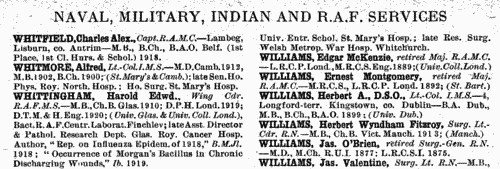
| Medical Practitioners in the Provinces
(1926)
The Medical Directory was split into several sections. The Provinces section covered all medical practitioners resident in England outside the London postal district (except those in Monmouthsire, who were listed under Wales). Each year a schedule was sent to each doctor to be returned to the publishers, so as to keep the directory up to date. In the directory the doctor's name is given first, in bold, surname first, in capitals; then current address. Next are the qualifications; the italic abbreviations in parentheses following the qualifications indicate the medical school at which they were gained. Then there is a list of posts and honours within the profession, starting with those then current; previous posts are preceded by the word 'late'. Finally, brief details are given of any publications.CRELLIN. Cost: £4.00.  | Sample scan, click to enlarge

| Boys entering King William's College, Isle of Man
(1928)
King William's College at Castletown on the Isle of Man was established in 1830. By 1928 about 290 boys were being educated there, 'of whom three-fourths are boarders, and the remainders sons of natives or residents in the Island.' Boys entered the junior school about 9 or 10 years of age, the upper school about 13; boys over 13 were not admitted 'unless attainments and character are specially satisfactory'. There were 'several nominations for the sons of clergy and others'.
Editions of the college register were published in 1905 and 1927. When this third edition was prepared, in 1956, it was felt unnecessary to repeat the whole of the register from 1830 onwards, a new starting point being chosen as September 1886, when the reverend Frank Bridgman Walters took office as principal.
The items are arranged alphabetically within term of entry; surname is given first, in bold, and then full christian names; then, to the right, in bold, precise date of birth, school house, and month of leaving the school. The abbreviations for houses are: C, Colbourne; D, Dickson; H, Hunt; Ha, Hangoside; J, Junior House; R, Raglan; S, School House (formerly Principal's); T, town houses occupied by masters who took in boys prior to September 1889; Tr, Trafford's; W, Walters.
Each entry then gives the boy's father's name (surname and initials) and address at that time; school honours (such as Prae., praepositor, XI, school cricket team); a career synopsis; and finally, in italics, to the right, year of death, or present address in 1956, if known.CRELLIN. Cost: £4.00.  | Sample scan, click to enlarge
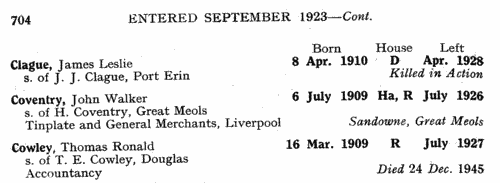
| Surgeons
(1928)
The Royal College of Surgeons, established by royal charters, issued this calendar 1 August 1928, including official lists of all its fellows, members, licentiates and diplomates. The register of fellows gives full name (surname first) and address (in italics), with dates of admission as fellow and member. The list of members gives year of admission, full name (surname first) and town or country of residence. The lists of licentiates give year of admission and full name, but no indication of current address: entries of fellows of the college are prefixed with a double dagger, those of members with an asterisk. The lists of diplomates give year of admission and full name (surname first), with those diplomates who were neither members nor fellows of the college indicated with a dagger. This is the index to the members.CRELLIN. Cost: £6.00.  | Sample scan, click to enlarge
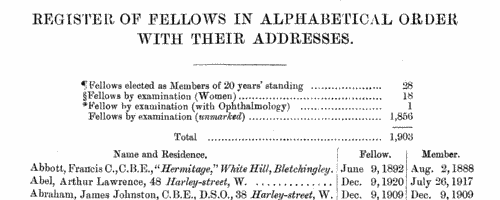
| Anglican clergy
(1930)
Crockford's Clerical Directory listed all Anglican clergy in the British Isles, India, the colonies, Europe, Asia and South America. The 59th annual issue, for 1930, is based on returns from all the individuals listed. The details given are: name (surname first, in capitals) in bold, prefixed by an asterisk in the case of university electors, and by a dagger whether the return had not been made, or it had been imperfectly filled up; name of theological college and/or university, and degrees, with years; a bold d followed by year and diocese signifies date of ordination as deacon and by which bishop; then a bold p, similarly for ordination as priest; posts (C: curate; I: incumbent; V; vicar; R: rector) with parishes and years; address; telephone number; and lists of books &c. where appropriate. In the case of the man then holding an English, Irish, Scottish or Welsh benefice, additional details are given - a bold P signifies the patron of the advowson; then the income, with items such as Q. A. B. (Queen Anne's Bounty), Eccles(iastical) Comm(issioners), Fees, e. o. (Easter Offerings), Pew Rents, T(ithe) R(ent) C(harge), Gl(ebe), &c.CRELLIN. Cost: £4.00.  | Sample scan, click to enlarge
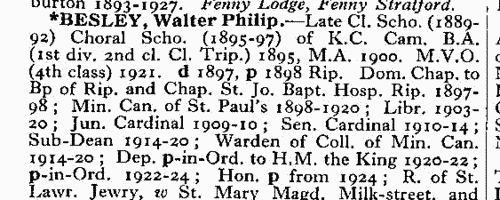
| Boys entering King William's College, Isle of Man
(1934)
King William's College at Castletown on the Isle of Man was established in 1830. By 1928 about 290 boys were being educated there, 'of whom three-fourths are boarders, and the remainders sons of natives or residents in the Island.' Boys entered the junior school about 9 or 10 years of age, the upper school about 13; boys over 13 were not admitted 'unless attainments and character are specially satisfactory'. There were 'several nominations for the sons of clergy and others'.
Editions of the college register were published in 1905 and 1927. When this third edition was prepared, in 1956, it was felt unnecessary to repeat the whole of the register from 1830 onwards, a new starting point being chosen as September 1886, when the reverend Frank Bridgman Walters took office as principal.
The items are arranged alphabetically within term of entry; surname is given first, in bold, and then full christian names; then, to the right, in bold, precise date of birth, school house, and month of leaving the school. The abbreviations for houses are: C, Colbourne; D, Dickson; H, Hunt; Ha, Hangoside; J, Junior House; R, Raglan; S, School House (formerly Principal's); T, town houses occupied by masters who took in boys prior to September 1889; Tr, Trafford's; W, Walters.
Each entry then gives the boy's father's name (surname and initials) and address at that time; school honours (such as Prae., praepositor, XI, school cricket team); a career synopsis; and finally, in italics, to the right, year of death, or present address in 1956, if known.CRELLIN. Cost: £4.00.  | Sample scan, click to enlarge
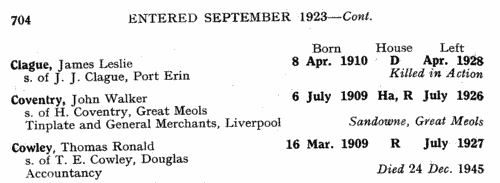
| Officers of the British Army and of the Indian Army
(1934)
The Half-Yearly Army List, issued By Authority, 30 June 1934, lists all officers in active service at that date, and this list was evidence of the status and rank of the officers contained in it. The entries are set out as a gradation list, by rank, from field-marshals to lieutenants, and within each rank in order of seniority at that rank. Each officer's name (surname first, in capitals, then christian name and present rank (with date of achieving that rank) and regiment &c. are given, for convenience, in bold type, with any national decorations in italics after the name. Each entry also gives date of birth, number of days service in the ranks, dates of service in each rank of officer, particular offices and postings (with dates) and, where appropriate, a summary of war service, and medals. For all but the oldest of the officers then serving, the war service details are for the Great War (1914-1921), and campaigns in Iraq, Waziristan, and the North West Frontier of India. War services are not given in this edition for Indian Army officers, except in that their entries are preceded by a crossed swords symbol where they have seen war service in a theatre of war overseas. After the gradation list of officers, there is a section for the Royal Malta Artillery; and then (pages 1152 to 1185) warrant officers - staff or garrison serjeant-majors, educational serjeant-majors, serjeant-major (physical training and educational) instructors, regimental serjeant-majors (and corporal-majors, farrier-serjeant majors, master gunners, assistant instructors in gunnery, experimental serjeant-majors, artillery clerks, farrier-serjeant-majors, artificer serjeant-majors, clerks of works, mechanist, superintending clerks, draughtsmen, 1st class staff serjeant-majors, transport, supply, conductors, sub-conductors, armourers, armament artificers, headmasters, schoolmasters, marine gunners, and bandmasters. The section for the Royal Army Chaplains' Department lists all chaplains (1st to 3rd class); and that for Queen Alexandra's Imperial Military Nursing Service has all matrons, sisters and staff nurses. The lists of nurses do not give date of birth: all are unmarried. The book concludes with the Yeomen of the Guard, the Honourable Company of Gentlemen-at-Arms, and the King's Body Guard for Scotland, in each case giving name (surname and initials, not christian names), honours, name of late regiment, and date of appointment.
CRELLIN. Cost: £4.00.  | Sample scan, click to enlarge
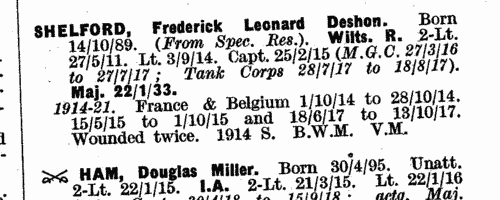
| Boys entering King William's College, Isle of Man
(1936)
King William's College at Castletown on the Isle of Man was established in 1830. By 1928 about 290 boys were being educated there, 'of whom three-fourths are boarders, and the remainders sons of natives or residents in the Island.' Boys entered the junior school about 9 or 10 years of age, the upper school about 13; boys over 13 were not admitted 'unless attainments and character are specially satisfactory'. There were 'several nominations for the sons of clergy and others'.
Editions of the college register were published in 1905 and 1927. When this third edition was prepared, in 1956, it was felt unnecessary to repeat the whole of the register from 1830 onwards, a new starting point being chosen as September 1886, when the reverend Frank Bridgman Walters took office as principal.
The items are arranged alphabetically within term of entry; surname is given first, in bold, and then full christian names; then, to the right, in bold, precise date of birth, school house, and month of leaving the school. The abbreviations for houses are: C, Colbourne; D, Dickson; H, Hunt; Ha, Hangoside; J, Junior House; R, Raglan; S, School House (formerly Principal's); T, town houses occupied by masters who took in boys prior to September 1889; Tr, Trafford's; W, Walters.
Each entry then gives the boy's father's name (surname and initials) and address at that time; school honours (such as Prae., praepositor, XI, school cricket team); a career synopsis; and finally, in italics, to the right, year of death, or present address in 1956, if known.CRELLIN. Cost: £4.00.  | Sample scan, click to enlarge
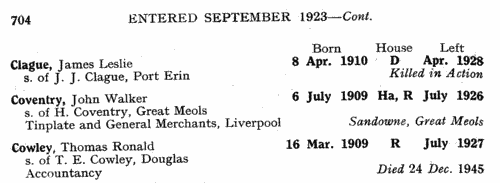
| Boys entering King William's College, Isle of Man
(1937)
King William's College at Castletown on the Isle of Man was established in 1830. By 1928 about 290 boys were being educated there, 'of whom three-fourths are boarders, and the remainders sons of natives or residents in the Island.' Boys entered the junior school about 9 or 10 years of age, the upper school about 13; boys over 13 were not admitted 'unless attainments and character are specially satisfactory'. There were 'several nominations for the sons of clergy and others'.
Editions of the college register were published in 1905 and 1927. When this third edition was prepared, in 1956, it was felt unnecessary to repeat the whole of the register from 1830 onwards, a new starting point being chosen as September 1886, when the reverend Frank Bridgman Walters took office as principal.
The items are arranged alphabetically within term of entry; surname is given first, in bold, and then full christian names; then, to the right, in bold, precise date of birth, school house, and month of leaving the school. The abbreviations for houses are: C, Colbourne; D, Dickson; H, Hunt; Ha, Hangoside; J, Junior House; R, Raglan; S, School House (formerly Principal's); T, town houses occupied by masters who took in boys prior to September 1889; Tr, Trafford's; W, Walters.
Each entry then gives the boy's father's name (surname and initials) and address at that time; school honours (such as Prae., praepositor, XI, school cricket team); a career synopsis; and finally, in italics, to the right, year of death, or present address in 1956, if known.CRELLIN. Cost: £4.00.  | Sample scan, click to enlarge
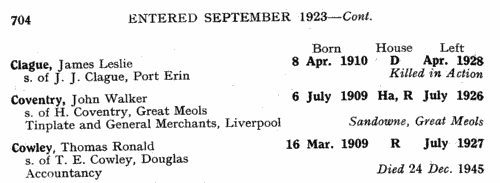
| Chartered Electrical Engineers (A. M. I. E. E.)
(1939)
The Institution of Electrical Engineers was founded in 1871 under the name of The Society of Telegraph Engineers, and incorporated by royal charter in 1921. The list of members, corrected to 1 September 1939, gives the names and addresses of the various grades of members. Members (M. I. E. E.) and Associate Members (A. M. I. E. E.) were entitled to describe themselves as Chartered Electrical Engineers. Then there are the Associates (Associate I. E. E.), Companions (Companion I. E. E.), Graduates (Graduate I. E. E.) and Students (Student I. E. E.). The names are given in bold, surname first; before each name is the year of attaining that grade; and for the higher grades the year of each lower grade is also given, e. g. (G. 1931).CRELLIN. Cost: £4.00.  | Sample scan, click to enlarge

|
Research your ancestry, family history, genealogy and one-name study by direct access to original records and archives indexed by surname.
|












